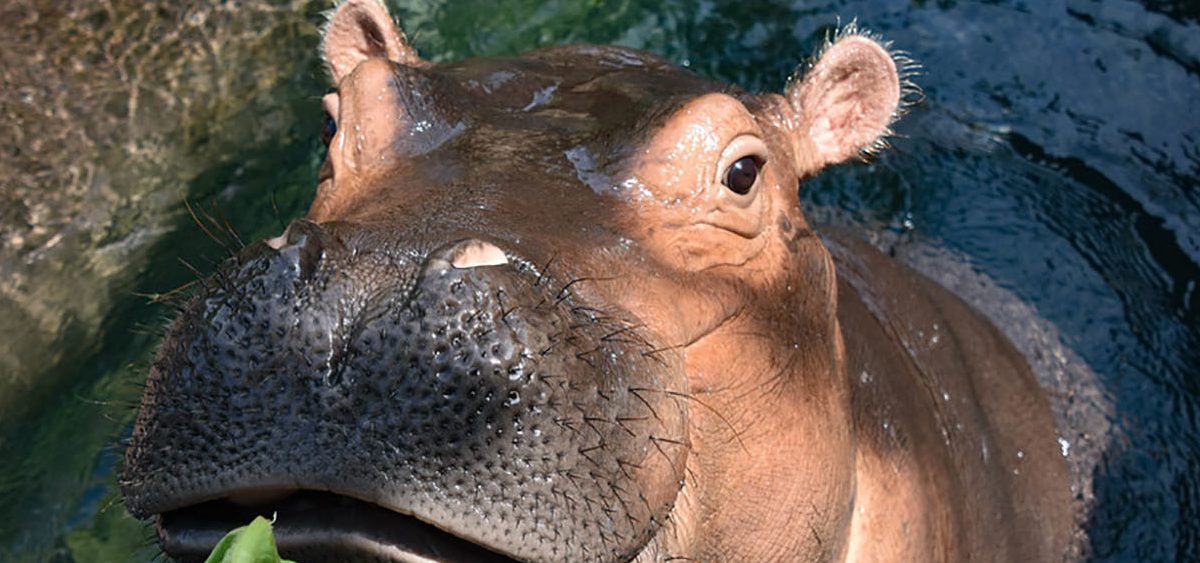News

Who Feeds Fiona? Cincinnati Zookeepers Make Sure There Are No Hungry Hippos
By: Jeff Lunden | NPR
Posted on:
CINCINNATI, Ohio (NPR) — Hippos can get hungry. Very hungry. So when zoos shut their doors to the public because of the coronavirus, zookeepers keep showing up to work to make sure everyone is fed.
Jenna Wingate feeds Fiona, the Cincinnati Zoo‘s 3-year-old, 1,300-pound hippo. Fiona was born premature, and Wingate has been looking after her since two hours after she was born.
“She was born right around 3 a.m. and I came into work at 5 a.m. that day.” Wingate recalls. “And my coworker was like, ‘All right. Do you want to switch? Take turns spooning her,’ because we were literally keeping her warm with our own body heat and blankets and towels and everything.”
With lots of care Fiona beat the odds — she was six weeks premature — and became a star at the Cincinnati Zoo. Wingate says Fiona loves people, but she still “knows how to act like a hippo” — a “perfect combination.”
But there are no people at the zoo right now, save for the 100 dedicated zookeepers, vets and support staff who look after 500 species and thousands of individual animals.
“We’re cutting off nonessential staff currently and splitting our departments into teams and working in smaller groups to kind of limit exposure between staff, all across the zoo and our animals,” says Keri Ann Bolerjack, who works in the zoo’s interpretive department. The goal, she says, is to keep the employees safe.
But the staff really want to be there.
“They dearly love animals and care for them through thick and thin,” says Cincinnati Zoo Director Thane Maynard.
Bolerjack, who just celebrated her five-year “zooversary,” takes care of Rico, a prehensile-tailed Brazilian porcupine. Rico might be the perfect animal metaphor for social distancing, but Bolerjack says she’s never been stuck by Rico’s quills — and she loves to feed him.
“He’s got these really long, sharp teeth that he uses to crunch all sorts of different things,” she says. “He really likes carrots, sweet potatoes. He likes the dried apricots. They’re kind of sticky. So he kind of makes a smacking sound when he eats those … everybody loves to watch him eat.”
Like Fiona, Rico has an online following. In fact, 700,000 new viewers have tuned into the zoo’s social media feeds since the coronavirus hit. (You can find the zoo on Instagram, Facebook, Twitter and YouTube.)
“It’s been really cool doing these live Home Safaris and seeing the support and how happy you are making people by doing them,” Wingate says.
But the zookeepers still miss the springtime crowds.
“I’ve never seen it so quiet and so empty,” Bolerjack says. She thinks having visitors is important for keeping up staff morale. The animals, on the other hand, probably don’t mind so much.
“We can kind of relax a little bit and focus 110% on the animals,” Wingate says. “Fiona, overall, she’s doing great — she’s living her regular life … and getting tons of attention from us.”
And, Wingate adds, she’s incredibly lucky that she’s still able to come to work.
“I’m needed,” she says. “It feels good to be needed.”
9(MDI4ODU1ODA1MDE0ODA3MTMyMDY2MTJiNQ000))

